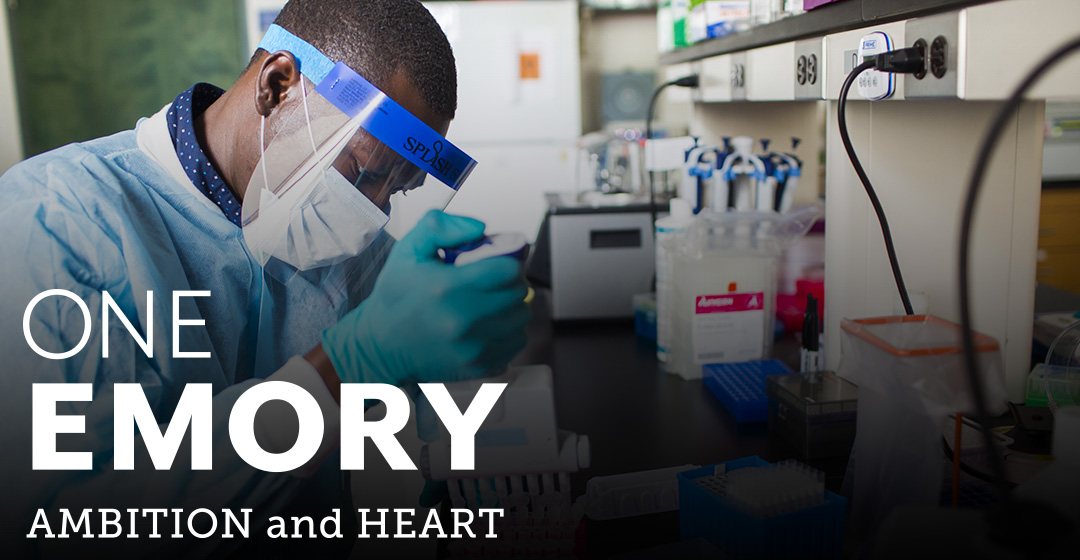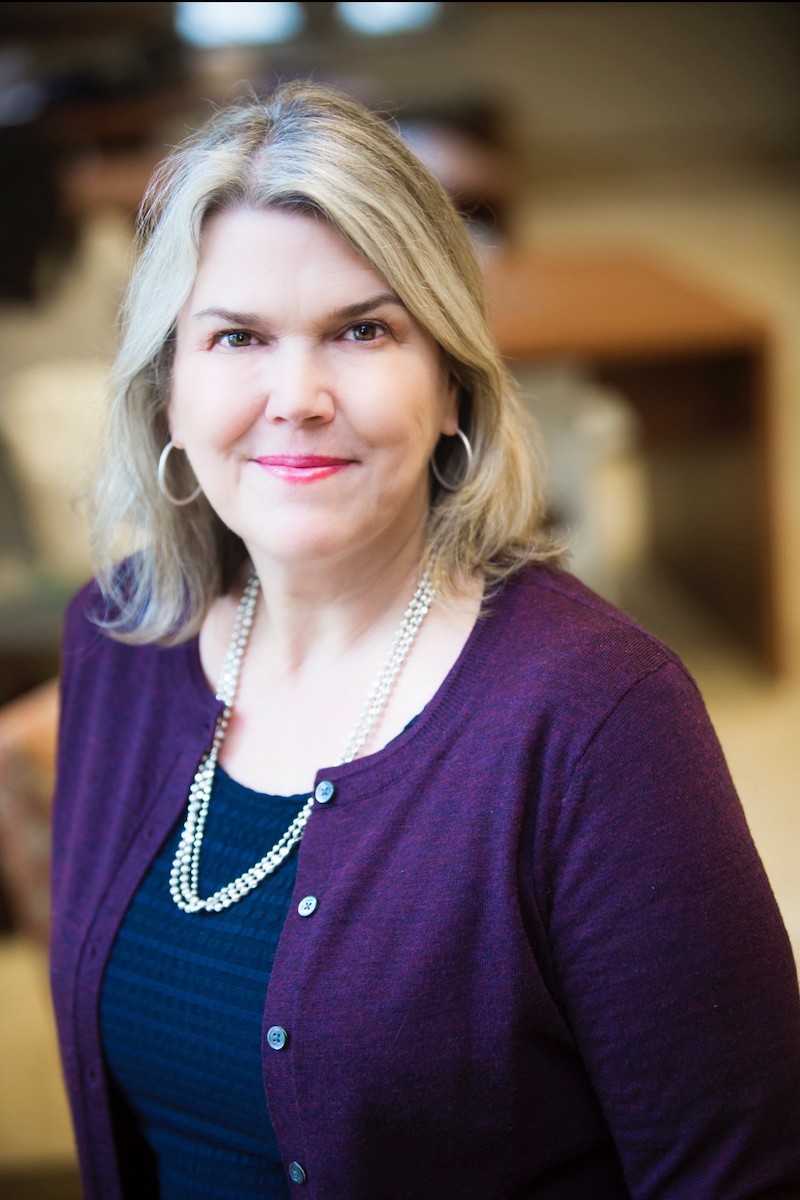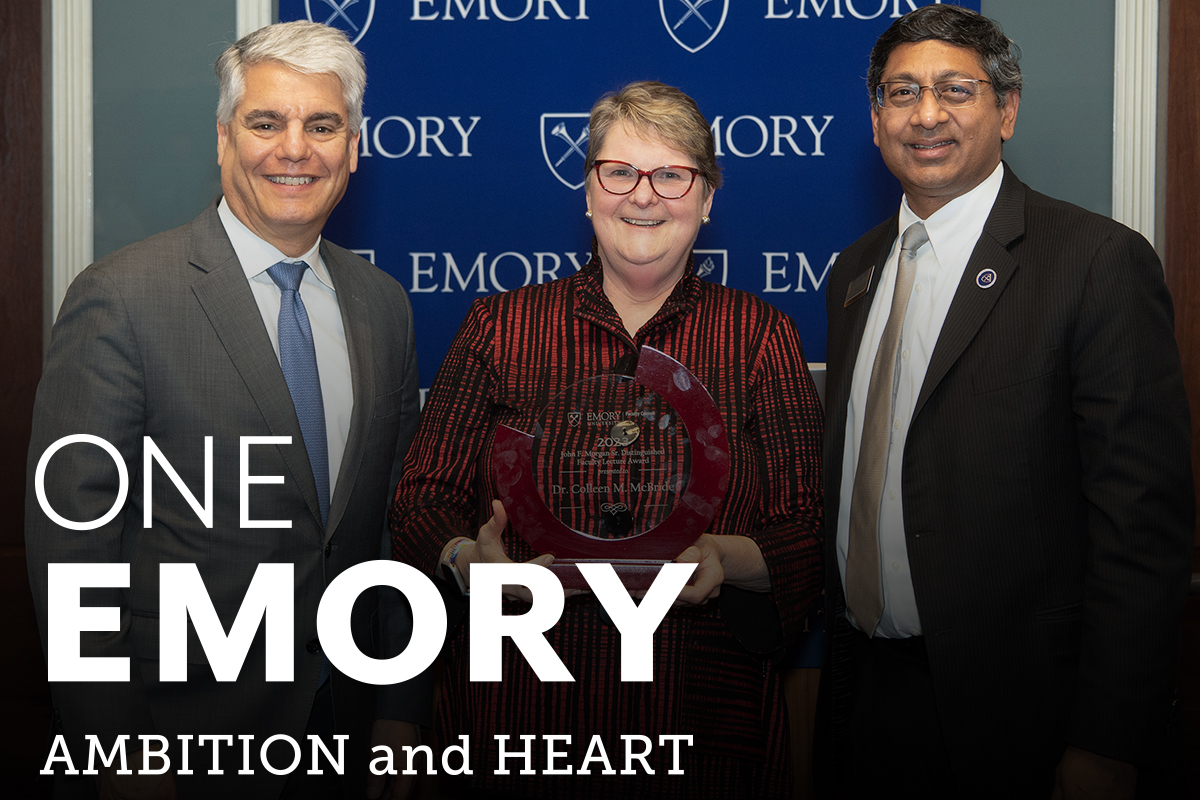
Innovation Through Scholarship and Creative Expression: ‘Providing more groundbreaking discoveries that benefit society’
By Michelle Ricker March 2, 2023Each week, Emory Report is featuring one of the six focus areas of One Emory: Ambition and Heart, the renewed strategic framework announced by President Fenves during the Feb. 7 Charter Week gathering.
Being innovative and inventive isn’t an aspiration; it is an expectation at Emory.
The extent of academic collaboration across Emory is already very impressive. And I want to see more of it with fewer barriers in the labs, libraries and collections, studios and classrooms — because innovations come as the result of the crossing and blending of disciplinary boundaries.
As Emory President Gregory L. Fenves introduced the renewed One Emory strategic framework, he discussed support for Innovation Through Scholarship and Creative Expression — one of the framework’s six focus areas
The One Emory framework will elevate the university’s commitment to harnessing imagination and discovery to address 21st-century challenges. “Innovation Through Scholarship and Creative Expression is about the exceptional scholarly accomplishments taking place at Emory,” Fenves said. “In every department and program, our faculty and researchers are leading their fields and disciplines. I want them to be bold, answer questions in new ways, and pioneer new approaches that attract the attention of colleagues and students on a global scale.”
Fenves pointed to reducing barriers in labs, libraries and collections, studios and classrooms to foster interdisciplinary innovations.
He also noted that Emory will invest in new areas of inquiry:
- The African American Studies department has launched a new PhD program, the first of its kind in the Southeast, which will welcome its first cohort of students in fall 2023.
- Provost Ravi V. Bellamkonda started the Emory Climate Research Initiative, which brings together faculty across disciplines to advance climate-related research and teaching, identifying how Emory can make contributions. “Emory experts are already working in many areas of climate research, notably the intersection between public health and climate change, but I want to see the university engaged on this issue, which is one of the defining challenges of our era,” Fenves said.
- Bellamkonda is also leading the AI.Humanity Initiative, which will work to harness the power of artificial intelligence (AI) and center it in the fields of health, social justice, philosophy, business, law, literature and the arts. The university plans to hire up to 75 faculty who will embed expertise in AI throughout various departments as they break new ground in understanding and developing this tool to solve human problems instead of causing them.
- The upcoming Arts and Humanistic Inquiry Initiative will bring together scholars from the humanities, social sciences, theology, social justice and the arts to explore the human experience. Twenty or more additional faculty across the schools will be hired to provide insights and expression to illuminate our world in new and profound ways.
For research areas, such as the sciences, where extramural funding is available, Emory has broken research funding records during the past two years, Fenves noted. “Building on this, I know our researchers can generate even more to power their ideas,” he said. “And during the next four years, I want to support faculty and researchers as they increase annual research expenditures from the current $790 million to $1 billion, providing more groundbreaking discoveries that benefit society.”
Innovation Through Scholarship and Creative Expression: 3 questions with Lisa Thompson of the School of Nursing

Lisa Thompson, associate professor
Kay Hinton, Emory Photo/Video
Thompson is among the inaugural faculty members of the Emory Climate Research Initiative. Her work focuses on household air pollution, primarily in low-resource countries where most people cook with solid fuel — such as wood or coal — in unvented stoves in their homes. “The people who are most exposed to this air pollution are the women who are cooking and their young children who spend a lot of time at home,” Thompson says.
Now, households are burning plastic, too. “I received funding from NIH to look at this problem and quantify the exposure to smoke from burning plastic in their homes and discover ways rural communities can address this mounting problem,” Thompson says of her current project in Guatemala, called Ecolectivos.
On Emory’s campus, she also works with undergraduate students involved in the Plastic Free Emory initiative.
“I think the biggest solution is just to refuse to use plastic and so I’m kind of an anti-plastic fanatic. Part of it is what everyone can do personally, like finding alternatives to using plastic by bringing your own water bottle, and for that reason, I'm really excited to be a part of the student-driven Break Free from Plastic pledge that President Fenves signed in 2021,” Thompson says. “They’re really enthusiastic and I love being the faculty liaison for this group of students.”
Q: Can you describe your work as a principal investigator with Ecolectivos?
The Ecolectivos trial started in August 2021 and the name represents both ecology and collective. This trial is really exciting and at the same time very challenging. I work together with Eri Saikawa (professor in environmental sciences at Emory College and director of Emory Climate Talks). We are a collaboration between investigators at three U.S. universities and Universidad del Valle de Guatemala. Emory, University of California, San Francisco, and University of Georgia are the three involved U.S. institutions.
This includes 10 Guatemalan team members who really run the show at our field station in Jalapa, Guatemala. Together, we’re developing community-based solutions and interventions to address the overwhelming plastic waste that is accumulating in rural areas in Guatemala, leaving communities with not much to do except burn or dump plastic waste. Through our working groups, we collaborate with communities to implement viable solutions, such as recycling, repurposing plastic for other household uses, organic composting and community clean-up campaigns. We include village elders, who talk about the way things used to be before plastic was everywhere.
This project is grounded in implementation science. We spent three years conducting pilot work with two communities to understand the plastic problem as experienced by the members of these villages. Mayari Hengstermann, of Universidad del Valle de Guatemala, is an anthropologist who has been foundational to this work. Part of the goal of this implementation research is to understand what works, how it works, will it work when we leave and can this work be expanded, or scaled up, to other neighboring villages as well.
One of my responsibilities is to be flexible about new ideas that come up as a result of working hand in hand with communities, but at the same time to adhere to the protocol that we developed. The balancing act is one of the big responsibilities. This is actually the first implementation science study funded by the National Institute of Environmental Health Sciences, so there’s a little pressure to get it right.
Q: A goal of this One Emory focus area is to use health sciences research to drive societal impact. How does this project accomplish those goals?
I like to tie the plastic problem to climate change because I don’t think a lot of people see a link between the two. First, plastic is a product of petroleum, and currently about 4-8% of oil production turns into plastic materials. With the movement in the United States to trade gas-fueled vehicles for electric vehicles, the global oil industry has responded by increasing plastic manufacturing, which is expected to account for about 20% of oil production by 2050.
Second, burning plastic creates a toxic soup of chemicals — when I walk by a house in Guatemala I know when they are burning plastic because it has a distinct smell to it. Our study will be looking at personal exposures to the burning of plastic to quantify what people are experiencing, but we will also quantify the amount of burning plastic that is emitted into the regional air inventories.
Our study aims to understand how local communities might fix the problem of burning plastic in their homes and communities, and subsequently to understand how this will impact global emissions of greenhouse gases that contribute to climate change.
Q: How has your research about plastic use and climate change informed your work on the Plastic Free Emory initiative?
Before the COVID pandemic, I was enthusiastic about the rapid change I was seeing. One day, the plastic straws were no longer being offered at the café in Rollins, with a little educational sign explaining that decision. Globally, things went backward during the pandemic and there’s a lot more plastic use again. Three plastic utensils wrapped in plastic, for instance, when all you need is a fork. A paper coffee cup wrapped in plastic. It was understandable during the beginning of the pandemic when we didn’t know the method of contamination, but we know better now.
However, the plastic manufacturing industries continue to profit — they are producing so much virgin plastic and need something to do with it. This is why I am an anti-plastic fanatic and am glad that the students in the Plastic Free Emory initiative are working with Emory’s cafeterias and procurement services to reduce the use and purchase of plastic.
There are still many challenges that we face, and there certainly are things we do can do personally to make a difference, but real change needs to happen at the level of large institutions. I’m really excited by how driven our Emory students are to make a difference in the world.






